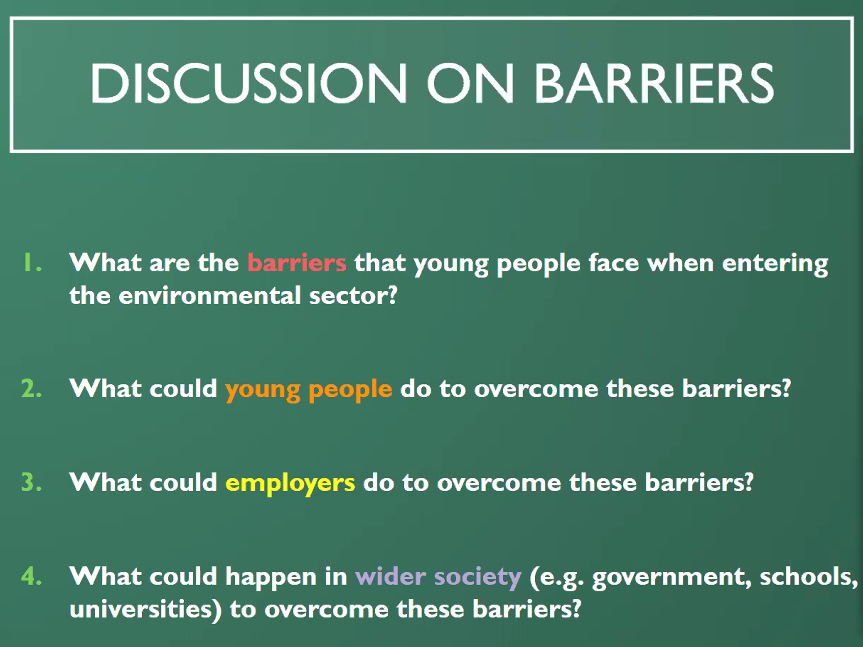Barriers & Solutions for Young People Entering the Environmental Sector

Introduction
The environmental sector (including conservation) is one of the hardest sectors for young people to enter. I recently attended a fantastic conference (Bridging the Gap: A Conference for Young Environmentalists), organised and led by Yorkshire Wildlife Trust’s Tomorrow’s Natural Leaders, which brought together young people and environmental organisations to discuss the value of young people, the barriers they face when entering the environmental sector and solutions to overcome these. The following post outlines the main points and thoughts I took away from the conference's discussion on barriers, which Thirza and I thought may be of interest to some of the WildHub community.

1. What are the barriers young people face when entering the environmental sector?
The conference highlighted a lack of awareness of the variety of jobs and pathways into the environmental sector (with some stating there is no traditional pathway), making it difficult for young people to know which direction to go in. Many expressed career advisors lack knowledge of the sector, causing a lack of advice and encouragement. Others stated that environmental volunteering opportunities, which can increase youths' awareness of the sector, are often during weekdays/school time/in remote areas, excluding young people from participating. Attendees also mentioned that the prevalence of temporary contracts in the sector is off-putting.
It was clear from the conference that aspiring environmental professionals are faced with internship/work experience/job opportunities often with fees, no or low pay. Financial difficulties are increasingly being recognised as a barrier for young people trying to enter the sector, creating a gap between those able to financially support themselves through opportunities and often expensive qualifications/memberships, and those who cannot.
With many people looking for well-paid/permanent positions there is great competition for such opportunities, with entry-level roles often also being applied for by candidates with years of experience. This has led many young people to undertake several years worth of internships/volunteering to gain experience and qualifications to compete with experienced professionals and secure an “entry-level” job.
Some young people raised that they felt their university education didn’t prioritise the same skills/experiences as employers require, with a lack of hands-on experience and a large focus on theory work, leaving graduates with an education but lack of relevant skills/experience to gain employment, leading them to feel the need to undertake unpaid work to gain an entry-level job. While of course, there is great value in undertaking voluntary and work experience roles some attendees with more experience stated that you can get stuck in a position where you don’t have enough experience for a job but too much for further training and internships. (Personally, I think you should never stop continual professional development, however, such development shouldn’t have to exist instead of employment.)
For many organisations, a surplus of volunteers and lack of funding means there is little incentive to create paid jobs. High competition for roles means that even entry-level jobs and volunteering opportunities can ask for advanced qualifications/experience, with complex personal specifications, many ‘essential’ requirements, experience and highly specific skills. This can cause lack of confidence issues for young people applying for jobs, feeling unqualified and inexperienced in such a competitive job market.
2. What could young people do to overcome these barriers?
The conference highlighted that although also a barrier, volunteering, undertaking work experience and further qualifications does help young people gain desired skills. Local organisations and special interest groups can help facilitate the transfer of knowledge to younger generations (and I would add, vice versa) and volunteering, whether environmental or not, can build transferable skills.
Other recommendations from conference attendees included being aware of what’s going on in the sector, such as changes in legislation and policy and, networking with those in the sector. (I have found this an invaluable way to gain advice, an understanding of jobs, routes into the sector and what’s going on in the field. Schemes such as WildHub’s monthly Fika pairing, are a great way to meet people in the sector and in my opinion, invaluable for young people.) Joining social media platforms such as LinkedIn allows anyone to search for employees with a particular organisation/job title, view more experienced professionals’ pathways into their careers and network with people directly for advice. Attending events/conferences (online or in person) are also great ways to network, make connections and develop knowledge. Mentoring schemes (such as A Focus On Nature’s scheme) also exist to help young people.
Know your worth, young people are valued. Employers value young people for skills/attributes such as our knowledge of technology and social media, our enthusiasm, adaptability, perspective, and fresh ideas. The conference highlighted that young people shouldn’t be afraid to apply for opportunities because they don’t meet every point on the job specification. Skills/knowledge can be learnt but passion and personal attributes cannot! Young people should also ask employers about training and development opportunities/budgets.
3. What could employers do to overcome these barriers?
The conference highlighted that further engagement with schools/universities/parents would increase the visibility of the environmental sector as a career choice. More flexible/online volunteering opportunities for youths would also be advantageous.
There is a clear call for more transparent internships/entry-level jobs and progression opportunities for young people, with organisations budgeting/fundraising to make such opportunities paid.
Of course, employers wish to recruit the most suitable candidate that they are confident can successfully undertake the job, however, the conference attendees suggested that employers could look for qualities and attributes over experience in candidates (particularly for entry-level jobs), recognising the value and potential of young people. Employers could also invest in future professionals, supporting development opportunities for employees. More professional mentors for young people would also assist early career professionals.
The conference also highlighted the benefits of having youths involved in organisations (see last paragraph of section 1). Having a youth board both enables an organisation to take account of younger generation’s views and opinions and provides valuable experiences for young people.
4. What could happen in wider society (e.g. government, schools, universities) to overcome these barriers?
The conference attendees raised that more education around nature and careers in the sector, particularly in schools/universities and with parents would be beneficial. Universities could also emphasise the importance of volunteering/work experience, promoting placements/internships and increasing the emphasis on and opportunities to gain practical skills. More affordable/accessible qualifications for young people would also be beneficial.
Publicly, further advocation for government, corporate and private funding for youth careers services, employment initiatives and access to nature would be beneficial.
Furthermore, the attendees and I thought that society needs to recognise the ability of young people. The climate change movement has demonstrated this more than ever, with young people such as Greta Thunberg and well-respected youth-run organisations such as the 2050 Climate Group in Scotland, making real impacts. Young people can do things themselves; there is not a need for constant guidance, but opportunity.
Thoughts I Took Away From the Conference
I worry that the above barriers are contributing to a lack of diversity in the sector. Conservation requires an understanding of many different perspectives and collaboration between many different people and sectors. Is the environmental sector therefore missing opportunities to employ people with different views, ideas and cultural knowledge which could benefit our work?
Of course, people wishing to enter the environmental sector have a passion and desire to help the natural world meaning many are willing to make personal sacrifices (no/low pay etc), but how can we conserve the environment if we can’t conserve future conservationists?
I feel the line between volunteering and working is often somewhat blurred in the environmental sector, making it a difficult job field for young people to navigate. I think it is easy to romanticise environmental jobs and forget that young people do need (and deserve) financial security to live. While I recognise the funding difficulties the environmental sector faces, I believe it’s not impossible to raise funds for young environmental professionals. The majority of environmental organisations are used to fundraising to undertake projects, thus including paid roles in funding application budgets or initiatives such as big fundraising events, corporate sponsors (although I recognise these require careful consideration) and partnerships are all possible fundraising methods to support young environmental professionals, which after all are the future of the sector.
While I was aware of many of the barriers young people face and how young people can overcome these, the conference increased my knowledge of the skills and attributes employers’ value young people for. I left the conference with a feeling of optimism that both young people and organisations are taking steps to understand and overcome the barriers young people face, encouraged by those who attended the conference. I still feel the environmental sector is a good career choice, with lots of exciting opportunities. I hope in the near future there will be more accessible opportunities in the sector for young people; as in my experience, given the opportunity, most young people will excel with enthusiasm and exceptionally hard work!
Please add your comments below. I’d love to hear if other people (particularly those further into their careers) have experienced similar barriers and how you overcame these. I’d also be interested to learn more about the barriers stopping employers from including and hiring young people more.
Acknowledgements:
A special thanks to Tomorrow’s Natural Leaders for allowing me to share the conference findings!
Update:
Since writing this post, Tomorrow’s Natural Leaders have compiled a detailed report of all the conference findings (also including a discussion on diversity in the sector) and results from an employer survey. To view the report documents, please visit Yorkshire Wildlife Trust’s website.




Please sign in or register for FREE
If you are a registered user on WildHub, please sign in
Thank you Daniele for sharing these valuable findings with us and for highlighting this important discussion on the actions we can take on each level. I hope we can continue this discussion and take action within our community. With their permission, would you perhaps be able to share the Tomorrow’s Natural Leaders's report, once published, with our community as well? Thanks again for sharing your thoughts and key take-aways and also for your positive feedback on the WildHub Fika, much appreciated.
Thank you Thriza, it's great to see so much optimistic engagement with the topic. Of course, I'll post a link to the full report as soon as it's published.
Thanks Daniele, that would be very helpful.
Hello, you are right about the job specifications might be putting people off and that enthuisaism does count for more as skills can be learnt! I am already building up my experience but I still feel like I am competing with David Attenorough clones or people as skilled a Marine Biologists with scuba diving and research equipment skills that few people have!! I believe we need to make conservation an activity before expecting it to be a jobs-only thing. That way, jobs are born! For example, I volunteer for a local nature conservation and ama helping someone with creating a new reserve. This keeps our council environmentalists in the job, made a Forest School and keeps contractors and charities like Groundwork in, which creates more opportunities on the whole. Lizzie.
Hi Lizzy, thank you for sharing your thoughts. It sounds like you're doing some great work!
Thank you for sharing this Daniele it sounds like a much-needed conference to talk about this. I am definitely keen to increase the accessibility of volunteering through online opportunities with less commitment. One of my favorite places is zooniverse where anyone can assist in a project at their own pace and as much as they are able to.
I also agree that employers really need to understand that "entry-level" job means entry-level and cant expect paid experience before hand.